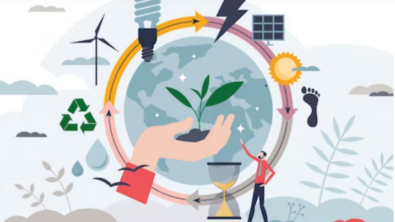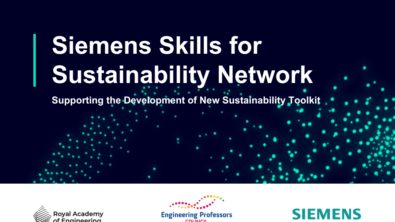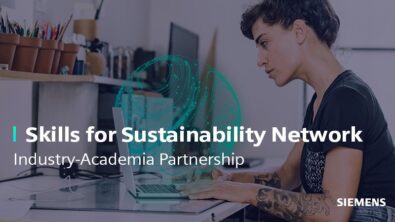The Student Voice; Siemens’ Skills for Sustainability Survey
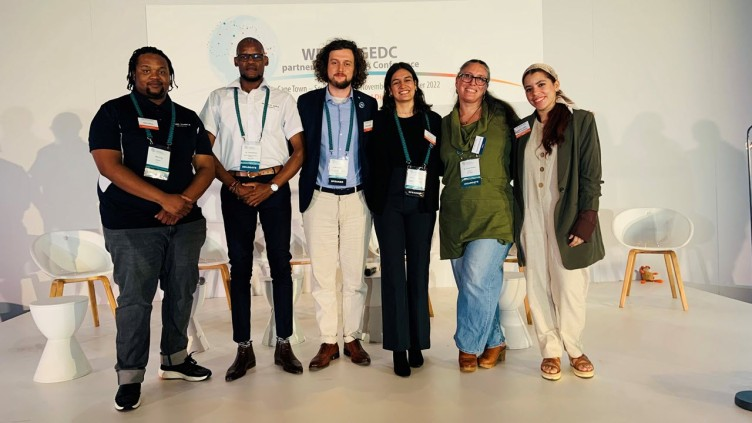
To create a genuinely innovative, sustainable future we must make a place for student voices at the table and listen deeply to them. To that end, the Skills for Sustainability Network launched the Siemens “Skills for Sustainability” survey as a pilot in November 2022 as a way to give students a voice in how sustainability is addressed globally in engineering education. The survey consisted of a literature review to build on existing work in the field and global focus groups which allowed students to define which topics were the most important. A total of 667 complete submissions were analyzed from around the globe. Data was collected with the support of the student organizations SPEED, ESTIEM, BEST, European Young Engineers, Siemens interns, and participants from Petrus’ experiential learning program. Read more to learn about significant findings from the survey and how the student voice was represented at the 2022 GEDC Industry Forum!

Students are responsible for implementing changes, so we believe that their voice should be heard.
Mihai Filimon, member of BEST and student panelist at GEDC Industry Forum
Survey Findings
Sustainability-related Topics in Education
The “Skills for Sustainability” survey revealed several key findings about students’ perspectives on addressing sustainability. When it comes to sustainability-related topics in education, students reported climate change as the most frequently covered topic, followed by sustainable energy production and management. Student responses also showed that the circular economy and the United Nations (UN) Sustainable Development Goals (SDGs) were the least covered topics. This may represent significant learning gaps and misconceptions in current education; for instance, the UN SDGs emphasize that sustainability is more than fighting climate change, but also include issues such as quality education and health and well-being.
Skills Needed to Address Sustainability
Students also had the opportunity to express what skills they felt were most important for addressing sustainability-related issues. They rated mindset, critical thinking and creativity, and innovation as the most important skills for tackling challenges. Notably, these kinds of transversal skills were generally rated higher than expertise in a specific subject. The survey also revealed regional, professional, and generational differences in responses. For instance, problem-solving skills were considered much more important to respondents in Africa, the Middle East, and Europe than from respondents in the Americas and Asia Pacific. In addition, respondents in computer science and IT fields rated the ability to work well with people of diverse profiles more highly than other groups, but also rated integrity and an ethical approach lower than all other groups. When comparing students and recent graduates with all respondents, the results show a shift in the relative importance of certain skills, with empathy ranked least important when taking all respondents into account but third most important by students and recent graduates.
Activities for Developing Sustainability Skills
The survey also explored which activities students found most important in addressing sustainability. Responses showed that the most useful activities were related to applying knowledge and skills in “real world” contexts. These contexts included project work, hands-on community or volunteer projects, in-person apprenticeships, internships or summer programs, and working on real business case studies. Generation-Z although, known for its online presence, did not rank online apprenticeships, internships or summer programs to be as useful as in-person experiences. Furthermore, relating back to the lack of UN SDG coverage in education, whereas only about 30% of respondents have covered UN SDGs in their education so far, 59% of respondents felt that projects directly linked to UN SDGs were useful.
Student Experience of Activities for Developing Sustainability Skills
As the survey indicated, students found real-world activities most useful in addressing sustainability. However, when asked which activities they experienced as students in higher education, only 22% of recent graduate respondents said they had experienced community or hands-on project work in their first year and nearly 20% of all respondents had had no experience in this area. The survey showed that none of the top-five activities ranked as most useful were commonly experienced by students during their education.
Comments and Suggestions for Leaders
Current gaps between students’ needs and what their education offers warrants a further discussion for how students want education and industry leaders to move forward. When asked for their input, four main areas for change emerged: hands-on learning, student creativity, embedding sustainability into education, and collaboration and educational reform. Students want to work on real-world projects and impact society with their ideas. In addition, they also want urgent changes to the engineering curriculum to make way for new skills and knowledge. Ultimately, these goals are attainable through greater collaboration between industry and academia.
Education is one of the most important tools that we can use to solve the problems we see everyday.
Thabelo Mohlala, student at Nelson Mandela University and student panelist at GEDC Industry Forum
The Student Voice at the 2022 GEDC Industry Forum
Since 2017, the Global Engineering Deans Council (GEDC) Industry Forum has brought together leaders from the private sector, education, and stakeholder organizations to develop engineering leaders, experts, and innovators of the future. At 2022’s GEDC Industry Forum in Cape Town, South Africa, a student panel reflected on the results of the “Skills for Sustainability” survey. The panel consisted of five students: Maria Laura Polo Gonzalez from SPEED, Mihai Filimon from BEST, Francisca Trigueiros from ESTIEM, Thabelo Mohlala from Nelson Mandela University, and Sihle Trolly from Nelson Mandela University, along with Jennifer Bradford from Siemens DISW who hosted the event. The panelists were able to voice their perspectives on how student organizations and industry should move forward given the needs expressed by students in the survey. They highlighted the importance of student advocacy, capacity-building workshops, competitions, and more design forums like the GEDC Forum for providing hands-on learning opportunities. Furthermore, they acknowledged the current issues in curriculum design, calling for more industry involvement, accessibility of resources, and mentorship opportunities.
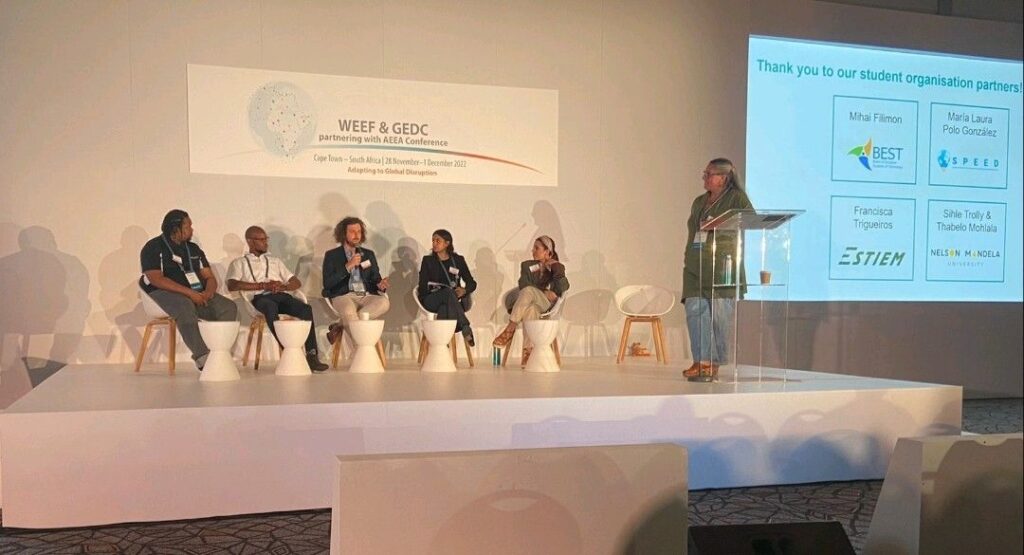
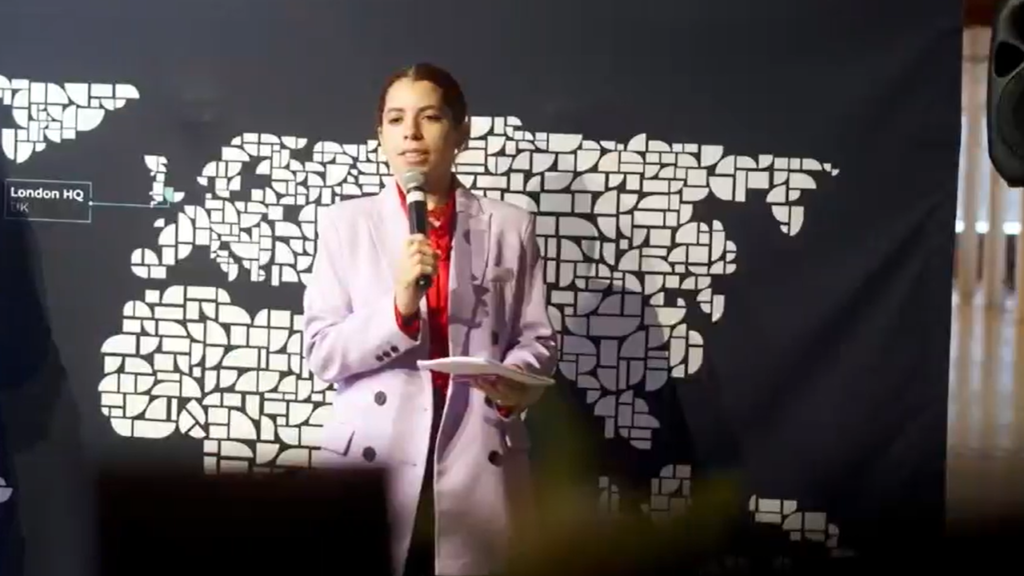
We’re increasing students’ participation in the development of education. The topic of sustainability is something that students are also striving for.
Francisca Trigueiros, member of ESTIEM and student panelist at GEDC Industry Forum
